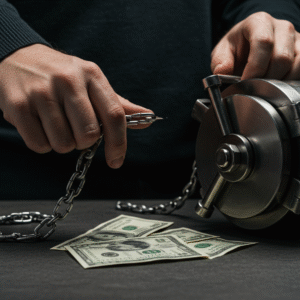This article may contain references to products or services from one or more of our advertisers or partners. We may receive compensation when you click on links to those products or services. Nonetheless, our opinions are our own.
The information presented in this article is accurate to the best of our knowledge at the time of publication. However, information is subject to change, and no guarantees are made about the continued accuracy or completeness of this content after its publication date.
In your 30s, it’s hard to miss the feeling of moving up. You might think you’re on the right track if you have a more stable income, new financial responsibilities, and a growing sense of confidence. But some choices that seem smart right now might slowly make your future less stable. What seems like progress in your finances now could turn into a big problem decades from now. The things you do and the choices you make in your early twenties often affect your financial future. Learning how some decisions that seem good at the time can affect you in the long run is a smart way to make sure you have long-term security. Many people in their 30s think these financial habits are smart, but they can quietly hurt your wealth and freedom later in life.
- When Lifestyle Growth Outpaces Income
- The High Cost of Postponing Investment
- Buying Property Without Long-Term Perspective
- The Pitfall of Overextending to Maintain Appearances
- The Value of a Well-Funded Emergency Reserve
- Relying on a Single Income Stream Without Diversification
- Final Thoughts
- Frequently Asked Questions
- Recommended Reads
When Lifestyle Growth Outpaces Income
People often go from being frugal to spending money on things that make them happy in their 30s. After years of holding back, you might really want to show off your success with visible upgrades, like a nicer car, designer clothes, or a bigger house. These choices often seem right, especially when they are linked to getting a promotion at work or reaching a new life goal. But these lifestyle changes often come with ongoing costs that make it harder to be flexible over time. The issue isn’t the occasional splurge; it’s that spending is always in line with rising income, which doesn’t leave much room for building real assets.
Potential long-term consequences include:
- Increased reliance on credit to sustain elevated expenses
- Lower savings contributions during high-earning years
- Lack of preparation for economic downturns or job changes
| Spending Category | Result After 20 to 30 Years |
|---|---|
| Leasing luxury vehicles | No asset accumulation, high cost cycle |
| Upscale housing with no equity | High recurring costs, no long-term value |
| Lifestyle-based credit card use | Compounded interest payments |
Avoiding these traps involves more than budgeting; it requires separating short-term self-validation from long-term sustainability.
The High Cost of Postponing Investment
People in their 30s often make excuses for putting off saving for retirement. Things like student loans, childcare, or travel often seem more important right now. But waiting too long to start investing can cost you a lot. If you miss a year in the market, you miss out on compounding growth, which means you’ll have to make much bigger contributions later on to catch up. If a 30-year-old puts $500 a month into an investment that earns an average of 7% a year, they could have more than $1 million by the time they turn 65. If you start at 40, that number goes down a lot, even if you double your monthly contributions.
| Starting Age | Monthly Contribution | Potential Value at 65 (7% annual return) |
|---|---|---|
| 30 | $500 | ~$1,045,000 |
| 40 | $1,000 | ~$623,000 |
| 50 | $1,500 | ~$339,000 |
The earlier funds are allocated to long-term vehicles, such as 401(k)s, IRAs, or diversified brokerage accounts, the greater the financial cushion later in life.
Buying Property Without Long-Term Perspective
Having a home is often seen as a sign of success. For some, it means safety; for others, it means a good investment. But getting a mortgage too quickly or buying a house that’s too big for you can quickly limit your financial freedom. People often forget about the many costs of owning a home, such as property taxes, insurance, maintenance, and repairs that come up unexpectedly. If you don’t think about these costs, they can make owning a home less valuable.
Before purchasing, consider:
- Is this property aligned with your income and future needs?
- Will high monthly costs limit your ability to save or invest?
- Are you compromising mobility or career growth for a location or status?
Choosing a property within realistic financial bounds protects future liquidity and keeps long-term savings on track.
Voted "Best Overall Budgeting App" by Forbes and WSJ
Monarch Money helps you budget, track spending, set goals, and plan your financial future—all in one app.
Get 50% OFF your first year with code MONARCHVIP
The Pitfall of Overextending to Maintain Appearances
In both social and professional settings, there is a quiet pressure to look like you’re doing well. There is a temptation to keep up with your friends or show off a certain lifestyle by buying designer clothes or going on expensive vacations. This often leads to spending that doesn’t help the economy grow. These choices might seem like personal rewards, but they often replace more important investments over time. What seems like a small splurge turns into a habit that makes it harder for you to save for the things that really matter: your freedom, stability, and the ability to make choices about your life without worrying about money. Instead of spending money on things that look good, put it toward things that will grow in value, like learning new skills, investing in the stock market, and making sure you save money.
The Value of a Well-Funded Emergency Reserve
Emergencies don’t give you a heads-up. But a lot of people forget how important it is to save up enough money, especially in their 30s when they feel like they have too many bills to pay. If you don’t have a financial cushion, unexpected costs, like medical bills, car repairs, or job loss, can cause you to take out high-interest loans or take money out of your retirement accounts. An emergency fund should have enough money to cover living costs for three to six months. It should be easy to get to, separate from investment accounts, and liquid. Not only does building this reserve give you peace of mind, but it also helps you avoid long-term problems that can happen because of short-term events.
Relying on a Single Income Stream Without Diversification

Having a steady paycheck in your 30s can make you feel safe, but depending on just one source of income doesn’t give you much room to be flexible. Changes in the market, restructuring of a company, or health problems can make even the most stable jobs less stable. Extra money from rental properties, dividend-paying assets, freelance work, or online business ventures can help ease the stress of your main job and protect you better against unexpected changes.
Diversifying income helps:
- Increase total savings potential
- Build financial independence earlier
- Offset risk in volatile career fields
Final Thoughts
If you don’t look at things from a bigger picture, what seems like smart money management in your 30s could have long-term effects. A high salary, a steady job, and new responsibilities can make you feel safe, but if you don’t plan ahead, your long-term growth may suffer. It’s not only smart to look at your spending habits, invest regularly, stay flexible, and be ready for the unexpected; it’s also important. Don’t fall into the trap of letting short-term happiness get in the way of long-term safety. The choices you make in your early twenties will affect the quality of your life decades from now.
Frequently Asked Questions
Which financial habits in your 30s often lead to instability in your 60s?
People often say that living paycheck to paycheck, not investing enough, buying property that is too expensive, and not saving enough for emergencies are some of their biggest regrets later in life. Even though these choices are often accepted, they tend to make it harder to build wealth over time.
Is renting always less financially sound than buying a home?
Not always. Renting can be more flexible and less expensive in some markets, especially when property prices are high or when people need to move around a lot. The financial benefit of owning a home depends on how long you plan to live there, how your mortgage is set up, and how much it costs to keep it up.
When should retirement savings start?
The earlier the better. Even modest contributions made in your early 30s can compound significantly over time. Waiting until your 40s or 50s to begin saving for retirement requires more aggressive and often more difficult financial planning.
How much should I keep in an emergency fund?
It is usually best to have enough money for three to six months of living expenses. If you have dependents or an income that isn’t steady, saving up to nine months’ worth may give you better protection.
Are side incomes really necessary if my job pays well?
Alternative sources of income aren’t strictly necessary, but they can protect your money and help you build wealth faster. They are especially useful in industries or economies that are likely to change.

Reviewed and edited by Albert Fang.
See a typo or want to suggest an edit/revision to the content? Use the contact us form to provide feedback.
At FangWallet, we value editorial integrity and open collaboration in curating quality content for readers to enjoy. Much appreciated for the assist.
Did you like our article and find it insightful? We encourage sharing the article link with family and friends to benefit as well - better yet, sharing on social media. Thank you for the support! 🍉
Article Title: 7 Financial Choices That Sound Smart at 30 But Wreck You at 60
https://fangwallet.com/2025/08/07/7-financial-choices-that-sound-smart-at-30-but-wreck-you-at-60/The FangWallet Promise
FangWallet is an editorially independent resource - founded on breaking down challenging financial concepts for anyone to understand since 2014. While we adhere to editorial integrity, note that this post may contain references to products from our partners.
The FangWallet promise is always to have your best interest in mind and be transparent and honest about the financial picture.
Become an Insider

Subscribe to get a free daily budget planner printable to help get your money on track!
Make passive money the right way. No spam.
Editorial Disclaimer: The editorial content on this page is not provided by any of the companies mentioned. The opinions expressed here are the author's alone.
The content of this website is for informational purposes only and does not represent investment advice, or an offer or solicitation to buy or sell any security, investment, or product. Investors are encouraged to do their own due diligence, and, if necessary, consult professional advising before making any investment decisions. Investing involves a high degree of risk, and financial losses may occur including the potential loss of principal.
Source Citation References:
+ Inspo
Belsky, G., & Gilovich, T. (2010). Why smart people make big money mistakes and how to correct them: Lessons from the life-changing science of behavioral economics. Simon and Schuster.












































